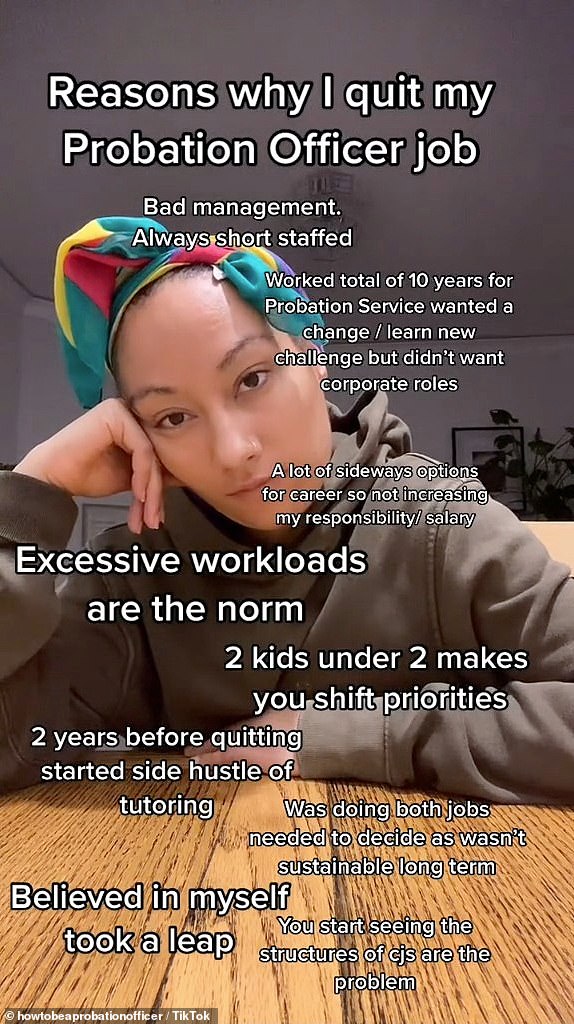As the pandemic wound down, workers across the globe began fleeing their jobs in droves, marking the start of what became known as ‘The Great Resignation’.
Next came ‘quiet quitting’ – the trend where employees, fed up but unable to leave, opted to do just enough to avoid being fired while keeping the door open in a volatile job market.
Now, we seem perpetually stuck with a rocky job market and many young graduates facing the harsh reality that their career prospects may never fully recover.
On top of this unemployment rates have been on the rise in recent months, and the labour market is fiercely competitive – so if you’re struggling to find a job, rest assured, you’re not alone.
However, if you’re not set on a specific career path, it could pay off to know which roles are currently in high demand.
And not all of them are skilled or specialised jobs, so you don’t need any qualifications to apply for them.

Anna, a teacher who has since left her job, said: ‘Reason number one is just the ridiculous hours that teachers are expected to work. Now in most professions if you work overtime you get paid for those hours, that is not the case for teaching’

In 2023 government figures showed that the target for secondary school teachers had been missed by 50 per cent (stock)
Teacher
Once viewed as a respected and rewarding profession, teaching has become increasingly difficult to recruit for.
In 2023 government figures showed that the target for secondary school teachers had been missed by 50 per cent, especially in physics, where the recruitment target hit only 17 per cent and RE only reaching a 44 per cent fill rate.
Factors such as large class sizes, heavy workloads, and lower-than-expected pay for the level of responsibility have contributed to a widespread lack of interest in entering the profession.
Many teachers cite the stress and pressure from constant demands and the increasing focus on results, alongside the challenge of maintaining discipline, as key reasons they leave the profession.
Anna, a teacher who has since left her job, said: ‘Reason number one is just the ridiculous hours that teachers are expected to work. Now in most professions if you work overtime you get paid for those hours, that is not the case for teaching.
‘You are working evening, weekends. There is always something to do; marking, setting targets, planning lessons, adapting resources. You will have a class of 30, it is so hard to deliver a good lesson for every single student in the class.’
Lorry driver
Despite the high demand for goods to be transported across the country, this role has become less appealing for many.
Long hours on the road, extended periods away from home, and the physically demanding nature of the work have all contributed to a steady decline in the number of people willing to take on this job.
The Trucking Lives survey, the largest and most comprehensive survey of current and former HGV drivers in the UK ever conducted, found that driving work has a negative impact on many workers, including physical health (54 per cent) and mental health (32 per cent) social relationships (51 per cent), relationship with partners (35 per cent) and relationships with children (34 per cent).
On top of that over half of current HGV driver respondents had considered quitting in the 12 months prior to completing the survey because of work-life incompatibility, low pay rates and stress.
Brian Martin told MailOnline: ‘The rise we got in 2020 only put us in line with what we should have been earning at the time. Since that pay rise we haven’t had another one until the end of 2024 which was only 50p an hour extra.
‘Most of the lorry parks are getting closed down to build houses or retail outlets on them so it’s harder and harder to try and park safely overnight, most industrial estates have no lorry parking facilities at all and charge fines for stopping more than a minute on their roads as they are all patrolled by cctv and security firms.
‘Motorway services charge £25 to £40 to park on them at night with hardly any hot meals available or simple washing facilities, plus a lot of companies will not reimburse the driver so it comes out of his own pockets.
‘If any young person told me they were thinking of becoming a HGV driver I would certainly put them off.’

Long hours on the road, extended periods away from home, and the physically demanding nature of the work have all contributed to a steady decline in the number of people willing to take on this job
Armed Forces
The armed forces, once an attractive option for many seeking adventure, stability, and a sense of duty, are now facing difficulty recruiting new soldiers.
The risks associated with military service, particularly with the possibility of being deployed to conflict zones, combined with the physically and mentally demanding nature of the job, have made military careers far less appealing.
Britain’s disappearing armed forces have shrunk by almost 200,000 troops since the the Cold War, in a staggering decline of the UK’s defences.
The RAF now has one of the smallest combat fleets in history, while the British Army looks set to drop below 70,000 for the first time since the Napoleonic era.
Meanwhile, the Royal Navy’s fleet – once the crowing jewel of Britain’s military might – now has barely enough active warships to field a single carrier strike group.
On top of this real terms pay for Army privates has increased by just 1.9 per cent since 2011, compared to 13.39 per cent for new junior doctors and 10.14 per cent for train drivers.
Ben McBean believes it is down to a shift in this country: ‘I think it is people’s attitude’s towards fighting for this country.
‘When you get politicians sending you off here, there and everywhere and turns out you didn’t need to be there any way. People are just sick and tired of it and say it is not worth it. It is not worth losing my limbs over. It is not worth getting killed over.’

Ben spoke on TikTok about why people leave arguing that it is largely down to mistrust in the government and the fact that people no longer want to fight for this country

One probation officer detailed why she was forced to leave the police force on TikTok
Police officer
The police officer role, ranking seventh, is facing similar challenges. Public scrutiny, rising crime rates, and the high-stress nature of the job are just a few reasons why fewer people are willing to pursue a career in law enforcement.
Concerns over safety, burnout, and the emotional toll the job can take on officers have all played a part in making this once-proud profession harder to fill.
Neighbourhood policing is now almost extinct in parts of England, MailOnline revealed.
Only 9 per cent of England and Wales’s 147,000 coppers are ‘bobbies on the beat’.
But this falls to 2.9 per cent in the city of London, an area covering tourist hotspots such as St Paul’s Cathedral and where hundreds of thousands of workers commute into each day.
In the worst-hit areas, our analysis suggests there is just one neighbourhood police officer to cover up to 11,795 residents.
While plans to reform the force will have to slow down as the Met faces a budget hole of £400m in 2025-26, a document submitted to the London Policing Board said.

Cleaners in the UK can expect to earn an average salary of between £17,000-£24,000 depending on experience (stock)
Cleaner
Demand for cleaning services is higher than ever before with 17 percent of private households now using a cleaner, and demand for specialised commercial cleaning services continues to rise.
The British Cleaning Council predicted the UK cleaning industry would generate 93,000 new jobs by 2024, but that 29 per cent of those jobs would be ‘hard to fill’.
The physically demanding nature of cleaning work, combined with low wages and limited opportunities for advancement, has made it less attractive to job seekers.
Cleaners in the UK can expect to earn an average salary of between £17,000-£24,000 depending on experience.
Whether it’s cleaning offices, schools, or hospitals, many people are turning away from these roles in favour of jobs with higher pay or greater career potential.
These trends illustrate a significant change in the UK’s job market, with certain professions no longer drawing the interest they once did.
The increasing automation of work, societal shifts in how people view work-life balance, and the evolving demands of industries have all contributed to this shift.
As we move further into 2025, it’s clear that employers will need to rethink recruitment strategies, offer better benefits, and address the changing attitudes towards these vital roles to ensure they can continue to fill them.







